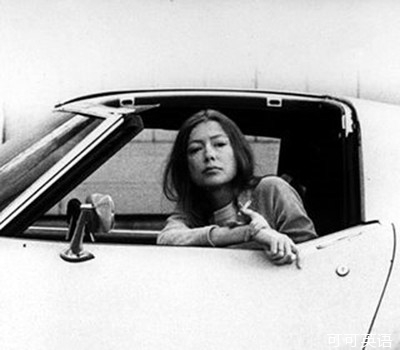Still in Books and Arts; Joan Didion memoir;Kind of blue;
Blue Nights. By Joan Didion.
Few memoirs are worth reading. When they are not tawdry opportunities to air grievances, settle scores or rationalise errors, they tend to be tales of adversity with a triumphant twist. This is what makes Joan Didion unique. Her non-fiction has always considered grand matters from a personal perspective, without making herself the centre of the story. Even when she writes about the hard drama of her own life, such as the sudden death of her husband followed by the death of her only daughter, her stories manage to be larger than her own grief.

This is how a memoir like “The Year of Magical Thinking” (2005) became a bestseller. In writing about the year that followed the fatal heart attack of John Gregory Dunne, her husband of nearly 40 years, Ms Didion used her experience to reflect on the fundamental absurdity of death. She movingly considered the way time makes the ordinary gifts of life extraordinary. The unmentioned horror of the book—an event that took place after she had finished writing but before it was published—was that her daughter Quintana Roo was dead, too, undone by a series of health problems that ended with acute pancreatitis at the age of 39.
这就是为什么像《奇幻思维之年》(2005)这样的回忆录热销的原因吧。写到她不满40岁的丈夫,约翰·格雷戈里·邓恩严重心脏病发作之后的日子,琼·迪丹用自己亲身经历去反思了死亡最本质的荒谬,并令人感动地思考着如何用时间让平凡的生命不再平凡。这本书还有件未曾提及的惨事——这件事就发生在书已成稿而并未出版之时——是琼·迪丹的女儿昆塔斯终于不用再遭受严重胰脏炎的折磨了,去世时仅39岁。
With “Blue Nights”, her first book since the earlier memoir, Ms Didion conveys the loneliness of living on without her child or husband, and the indignities of ageing. For decades her life had been charmed, even more so than she had realised. But in a matter of months in 2003 everything turned unspeakably grim. “It is horrible to see oneself die without children,” she quotes Napoleon as saying. This is a difficult book, but not a sentimental one. Ms Didion has a remarkable ability to consider her own feelings without letting her prose turn soggy with emotion.
而用《忧郁的夜》,这本她早期回忆录之后的头一本书,琼·迪丹表达了失去丈夫和女儿后生活的孤独和衰老带给她的侮辱。几十年来她的生活如同被施了魔法一般,更奇妙的是她自己没有意识到这一点。2003年的几个月中,一切变得无法形容的可怖。引用拿破仑的名言,她说道:“眼睁睁地看着自己无儿无女地死去是如此可怕。”这是一本关于困难的书,但却不是关于脆弱的。琼·迪丹有一种非凡的能力,将沉闷的情绪排除在自己的散文之外,不带感情地思考。
“Today would be her wedding anniversary,” she writes at the beginning, and then evokes the scene of her daughter's summer wedding in Manhattan in 2003.There were cucumber and watercress sandwiches, and a peach-coloured cake from Payard. Quintana wore stephanotis in her hair. Ms Didion returns to these details in later chapters—the stephanotis, the cake—using this repetition to illustrate the way she is haunted by memories. After a lifetime of travel and dynamism, she now appears anchored in New York by the detritus of life. Her drawers and cupboards are filled with mementoes (her husband's raincoats, her daughter's baby teeth) which serve “only to make clear how inadequately I appreciated the moment when it was here.”
“今天是她的结婚周年纪念日,”琼·迪丹在开头写到,唤起了2003年夏季女儿在曼哈顿岛婚礼上的场景。宴会上有黄瓜和水田芥三明治,从Payard送来的粉色蛋糕,昆塔斯在头发上别着千金子藤。琼·迪丹在之后的章节——千金子藤,蛋糕——里回味着这些细节,用这些反复的回味阐述了她是如何被回忆萦绕的。终其一生的漂泊与动荡之后,生命的碎片似乎把她锚定在了纽约。塞满抽屉和橱柜的纪念品(丈夫的雨衣,女儿的婴儿牙)“只是为了让我弄明白,这些东西在时我对它们的欣赏是多么地不合适。”
The appeal of Ms Didion has long been her insight mixed with something glamorous; she is both of this world and a world apart. Memories here are cluttered with brand names (Chanel, Corvette, the Ritz) and glittering friends (Natasha Richardson, Patti Smith). The effect can be distracting, but Ms Didion sometimes uses these details to worry over the oddity of Quintana's life (her adopted daughter often struggled with depression), and also to marvel at her own naivety. “I do not know many people who think they have succeeded as parents,” she writes. In regarding herself as a mother, her remorse festers unchecked.
琼·迪丹的感染力在于长久以来她能将自己的洞察力与这些极富魅力的东西很好地调和在一起。她既能溶于世界,又能与世界分离开来。这些记忆与名牌(香奈儿、克尔维特、万豪)和那些显赫朋友的名字(娜塔莎·简·理查德森,派提·史密斯)交织在一起。这样做能起到转移痛苦的效果,而琼·迪丹有时也因为这些细节苦恼女儿昆塔斯生活的不幸(她的养女常常与忧郁抗争),也会惊讶自己天真的本性。“我认为很多人并不认为自己做父母很成功,”她写到。做为母亲而言,她的懊悔带来的痛苦从未制止。
Now 75, Ms Didion's gaze is turned backwards. Her recollections meander and loop back, interrupted only by distressing questions that no one is left to answer (“Did I get this all wrong?”). Often these questions consider the choices she made as a mother (“Was I always the problem?”) and her own increasing frailty (“What if I can never again locate the words that work?”). With “Blue Nights”, named for the intense and portentous beauty of the dying light on a summer day, Ms Didion has translated the sad hum of her thoughts into a profound meditation on mortality. The result aches with a wisdom that feels dreadfully earned.
已经75岁了,琼·迪丹的注意力也涣散了。她的回忆缓慢而又反反复复,只有在那些无法让人回答的悲情问题(“我所做的这一切都是错的吗/我得到的这些全都是错误吗?”)时才被打断。这些问题经常是思考做为一个母亲她的选择(“总是我有问题?”),和她自己越来越多的弱点(“如果我再也找不到那些能用的词语会怎样?”)。借着《忧郁的夜》,这部以某个夏日里生命之光暗淡时的那种紧张而又不吉之美命名的书,琼·迪丹将自己思维里悲伤的呻吟译成了对死亡深厚的沉思。所产生的结果是与这位悲伤的智者一起伤痛。











